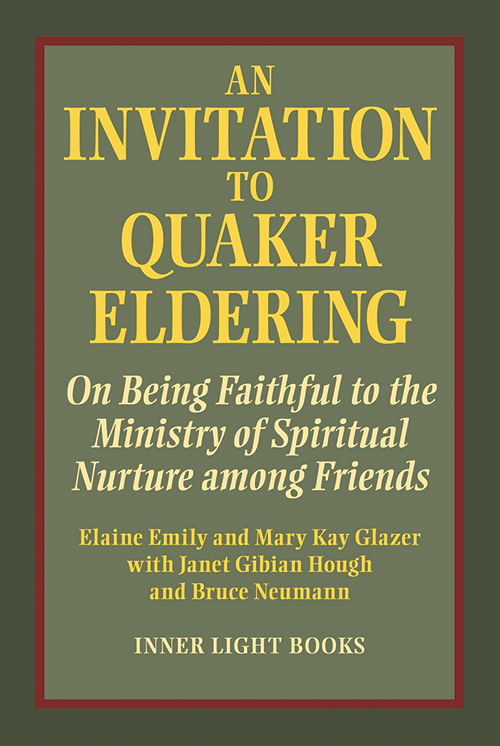
An Invitation to Quaker Eldering: On Being Faithful to the Ministry of Spiritual Nurture among Friends
Reviewed by Paul Buckley
August 1, 2023
By Elaine Emily and Mary Kay Glazer. Inner Light Books, 2022. 225 pages. $35/hardcover; $25/paperback; $10/eBook.
Two hundred and fifty years ago, Quaker meetings named women and men to three separate and distinct leadership roles: ministers, elders, and overseers. Ministers were recognized for gifts in offering vocal ministry during meetings for worship. Overseers exercised care for the welfare of members and attenders—attempting to address complaints or estrangements from harmony which might impair the participation of individuals in worship and the business of their meetings.
Finally, elders were Friends who were recognized as spiritually gifted with exceptional concern for the deeper spiritual life of the meeting. They were charged especially with encouraging and guiding vocal ministry during meetings for worship. They were possessed of considerable insight into character, alert spiritual discernment, good judgment, and a fund of ready tact and open friendliness. These Friends were humbly dedicated to a deeply felt zeal for the spiritual growth of the Society—upheld by the power of constant, watchful prayer. Elders were charged with a particular duty to give encouragement and oversight to those who regularly served in the vocal ministry or offered public prayer.
Ministers and elders were recognized as possessing unique spiritual gifts and usually remained in their positions until they died or resigned, whereas overseers were named for terms of a few years.
In many yearly meetings, these offices fell into disuse. Overseers’ roles diminished as people became less inclined to accept oversight. In meetings that adopted a programmed form of worship and hired pastors, the expectations of ministry changed from a divine gift that was recognized to a set of necessary skills that were acquired and recorded. In more liberal unprogrammed meetings, the idea of recognizing gifts in vocal ministry came to be seen by many as somehow denying the ministry of all. To preserve a sense of equality, this resulted in some meetings relinquishing the practice of recognizing ministers. Without recognized ministers to care for, there was no need for elders or their responsibilities. Although the historic tripartite structure for care and leadership endured in some meetings, most of the Quaker world changed.
In the past few decades, a number of Friends have advocated for a revived recognition of the necessary spiritual gifts of ministers. Among other written works, Brian Drayton’s On Living with a Concern for Gospel Ministry (2005) was a clarion call for this movement. An Invitation to Quaker Eldering hopes to fill a similar role in the rediscovery of eldering among Friends.
An Invitation to Quaker Eldering also draws on a somewhat different strand of Quaker eldering. While in times past, most elders were concerned for the care of settled meetings for worship and their associated ministers, there have always been those whose focus was on nurturing the traveling ministers who initially spread the Quaker message in Europe and the Americas and then bound together and nurtured the Society’s scattered meetings. In accompanying these ministers, elders not only looked after the spiritual concerns but also the temporal needs of these travelers. This practice of accompaniment has been continued in the years since and provides the model that contemporary Friends have followed.
Just as ministers are the stewards of spiritual gifts, An Invitation to Quaker Eldering sees elders as entrusted by the Divine with a talent for spiritual care and nurture:
Elders are those who have a distinct and noticeable gift of spiritual groundedness that uplifts, deepens, and broadens the spiritual core of a meeting or gathering. When the gifts of eldering are present, Spirit often takes individuals and groups to places they might not otherwise go.
This is a book that needs and deserves careful reading, as there are multiple perspectives represented. In the acknowledgments, coauthors Elaine Emily and Mary Kay Glazer give thanks and credit to Friends Bruce Neumann and Janet Gibian Hough for being crucial to the book’s development. In addition to these four primary contributors, there are extracts from many others who are experienced elders. Each of these people brings a slightly different vocabulary and awareness of eldering to their writings. The book requires paying close attention to the words used and the ways in which they are used. It is tempting to “translate” what is on the page into terminology that the reader finds more comfortable. For example, some of the authors use “Spirit” in places where I might write “God.” Substituting one term for the other results in a perfectly readable text, but it obscures significant word choices and creates sentences a reader would write rather than truly understanding what the author has written. This extends even to the word elder. This is a richly detailed text with a lot for contemporary Friends to consider. It is worth taking the time to understand what each contributor is saying.
If you have experience as an elder, this book provides an opportunity to explore your discipline in more depth. For others, it may open up possibilities that you had not considered; and whether that leads you to consider if you have a calling to this ancient practice, it will deepen your appreciation of our spiritual tradition.
Paul Buckley has written numerous articles and books on Quaker history, faith, and practice. He worships with Clear Creek Meeting in Richmond, Ind., and travels in the ministry urging spiritual renewal among Friends. His most recent book is Primitive Quakerism Revived: Living as Friends in the Twenty-First Century. Contact: bucklpa@earlham.edu.



Comments on Friendsjournal.org may be used in the Forum of the print magazine and may be edited for length and clarity.